Related Research Articles

Alfonso Tiberio Cuarón Orozco is a Mexican filmmaker. His accolades include five Academy Awards, seven BAFTA Awards, and three Golden Globe Awards.

Acapulco de Juárez, commonly called Acapulco, is a city and major seaport in the state of Guerrero on the Pacific Coast of Mexico, 380 kilometres (240 mi) south of Mexico City. Located on a deep, semicircular bay, Acapulco has been a port since the early colonial period of Mexico's history. It is a port of call for shipping and cruise lines running between Panama and San Francisco, California, United States. The city of Acapulco is the largest in the state, far larger than the state capital Chilpancingo. Acapulco is also Mexico's largest beach and balneario resort city. Acapulco de Juárez, Guerrero is the municipal seat of the municipality of Acapulco, Guerrero.

Mexico City is the capital and largest city of Mexico, and the most populous city in North America. It is one of the most important cultural and financial centers in the world. Mexico City is located in the Valley of Mexico within the high Mexican central plateau, at an altitude of 2,240 meters (7,350 ft). The city has 16 boroughs or demarcaciones territoriales, which are in turn divided into neighborhoods or colonias.
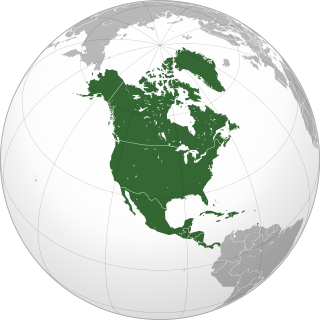
North America is a continent in the Northern and Western Hemispheres. North America is bordered to the north by the Arctic Ocean, to the east by the Atlantic Ocean, to the southeast by South America and the Caribbean Sea, and to the west and south by the Pacific Ocean. The region includes the Bahamas, Bermuda, Canada, the Caribbean, Central America, Clipperton Island, Greenland, Mexico, Saint Pierre and Miquelon, the Turks and Caicos Islands, and the United States.
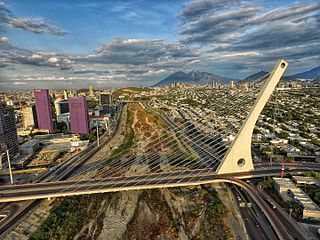
Monterrey is the capital and largest city of the northeastern state of Nuevo León, Mexico, and the ninth-largest city and second largest metro area in Mexico behind Greater Mexico City. Located at the foothills of the Sierra Madre Oriental, Monterrey is a major North American business and industrial hub, as well as the most populous city in northern Mexico.

Albuquerque, also known as ABQ, Burque, the Duke City, and in the past 'the Q', is the most populous city in the U.S. state of New Mexico. Founded in 1706 as La Villa de Alburquerque by Santa Fe de Nuevo México governor Francisco Cuervo y Valdés, and named in honor of Francisco Fernández de la Cueva, 10th Duke of Alburquerque and Viceroy of New Spain, it served as an outpost on El Camino Real linking Mexico City to the northernmost territories of New Spain.

El Paso is a city in and the county seat of El Paso County, Texas, United States. The 2020 population of the city from the U.S. Census Bureau was 678,815, making it the 22nd-most populous city in the U.S., the most populous city in West Texas, and the sixth-most populous city in Texas. Its metropolitan statistical area covers all of El Paso and Hudspeth counties in Texas, and had a population of 868,859 in 2020.

Cancún is the most populous city in the Mexican state of Quintana Roo, located in southeast Mexico on the northeast coast of the Yucatán Peninsula. It is a significant tourist destination in Mexico and the seat of the municipality of Benito Juárez. The city is situated on the Caribbean Sea and is one of Mexico's easternmost points. Cancún is located just north of Mexico's Caribbean coast resort area known as the Riviera Maya.

Carlos Slim Helú is a Mexican business magnate, investor, and philanthropist. From 2010 to 2013, Slim was ranked as the richest person in the world by Forbes business magazine. He derived his fortune from his extensive holdings in a considerable number of Mexican companies through his conglomerate, Grupo Carso. As of December 2024, the Bloomberg Billionaires Index ranked him as the 18th-richest person in the world, with a net worth of US$85 billion or about 4% of Mexico's GDP, making him the richest person in Latin America.
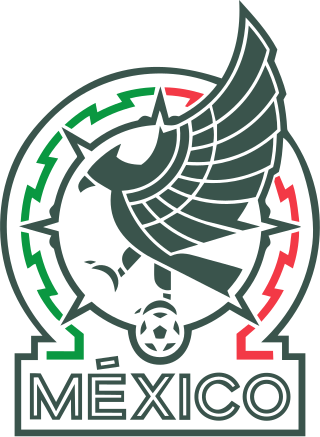
The Mexico national football team represents Mexico in men's international football and is governed by the Federación Mexicana de Fútbol. It has been a member of FIFA since 1929 and competes as a member of CONCACAF since 1961, of which it was one of the founding members. It was also a member of NAFC from 1946 to 1961, which was a predecessor confederation of CONCACAF and the governing body of football in North America at the time.

Lucha libre is the term for the style of professional wrestling originating in Mexico. Since its introduction to Mexico in the early 20th century, it has developed into a unique form of the genre, characterized by colorful masks, rapid sequences of holds and maneuvers, and "high-flying" maneuvers, some of which have been adopted in the United States, Japan, and elsewhere. The wearing of masks has developed special significance, and matches are sometimes contested in which the loser must permanently remove his mask, which is a wager with a high degree of weight attached. Tag team wrestling is especially prevalent in lucha libre, particularly matches with three-member teams, called trios.

Club de Fútbol América S.A. de C.V., commonly known as Club América, is a professional football club based in Mexico City. Nicknamed Las Águilas, it competes in Liga MX, the top tier of Mexican football. The club was founded in 1916, and since 1959 has been owned by mass media company Televisa. The team plays its home games at Estadio Azteca, the largest stadium in Latin America and one of the largest in the world.
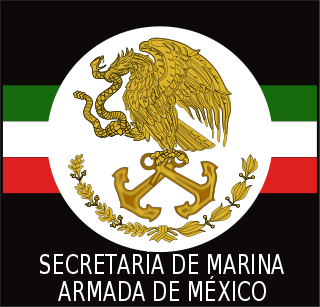
The Mexican Navy is one of the two independent armed forces of Mexico. The actual naval forces are called the Armada de México. The Secretaría de Marina (SEMAR) includes both the Armada itself and the attached ministerial and civil service. The commander of the Navy is the Secretary of the Navy, who is both a cabinet minister and a career naval officer.

Mexico, officially the United Mexican States, is a country in the southern portion of North America. Covering 1,972,550 km2, it is the world's 13th largest country by area; with a population of over 130 million, it is the 10th most populous country and has the most Spanish speakers in the world. Mexico is a constitutional republic comprising 31 states and Mexico City, its capital and largest city, which is among the world's most populous metropolitan areas. The country borders the United States to the north; as well as Guatemala and Belize to the southeast. It has maritime borders with the Pacific Ocean to the west, the Caribbean Sea to the southeast, and the Gulf of Mexico to the east.

Joaquín Archivaldo Guzmán Loera, commonly known as "El Chapo", is a Mexican former drug lord and a former leader within the Sinaloa Cartel. Guzmán is believed to be responsible for the deaths of over 34,000 people, and was considered to be the most powerful drug trafficker in the world until he was extradited to the United States and sentenced to life in prison.
Miguel Ángel Félix Gallardo, commonly referred to by his aliases El Jefe de Jefes and El Padrino, is a convicted Mexican drug kingpin who was one of the founders of the Guadalajara Cartel, which controlled much of the drug trafficking in Mexico and the corridors along the Mexico–United States border in the 1980s.

Rafael "Rafa" Caro Quintero is a Mexican drug lord who co-founded the now-disintegrated Guadalajara Cartel with Miguel Ángel Félix Gallardo and other drug traffickers in the late 1970s. He is the brother of fellow drug trafficker Miguel Caro Quintero, founder and former leader of the defunct Sonora Cartel.

The Mexican drug war is an ongoing asymmetric armed conflict between the Mexican government and various drug trafficking syndicates. When the Mexican military intervened in 2006, the government's main objective was to reduce drug-related violence. The Mexican government has asserted that their primary focus is dismantling the cartels and preventing drug trafficking. The conflict has been described as the Mexican theater of the global war on drugs, as led by the United States federal government.

The Sinaloa Cartel, also known as the Guzmán-Loera Organization, the Federation, the Blood Alliance, or the Pacific Cartel, is a large, transnational organized crime syndicate based in the city of Culiacán, Sinaloa, Mexico that specializes in illegal drug trafficking and money laundering.
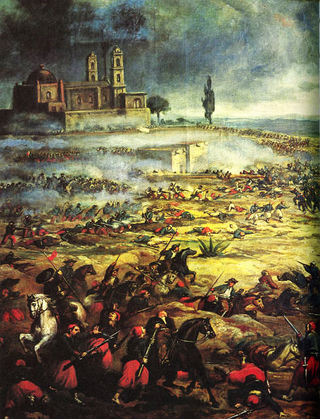
Cinco de Mayo is an annual celebration held on May 5 to celebrate Mexico's victory over the Second French Empire at the Battle of Puebla in 1862, led by General Ignacio Zaragoza. Zaragoza died months after the battle from an illness, however, and a larger French force ultimately defeated the Mexican army at the Second Battle of Puebla and then occupied Mexico City. Following the end of the American Civil War in 1865, the United States began lending money and guns to the Mexican Liberals, pushing France and Mexican Conservatives to the edge of defeat. At the opening of the French chambers in January 1866, Napoleon III announced that he would withdraw French troops from Mexico. In reply to a French request for American neutrality, the American secretary of state William H. Seward replied that French withdrawal from Mexico should be unconditional.
References
- ↑ "Perfil del legislador". Legislative Information System. Retrieved 1 December 2013.